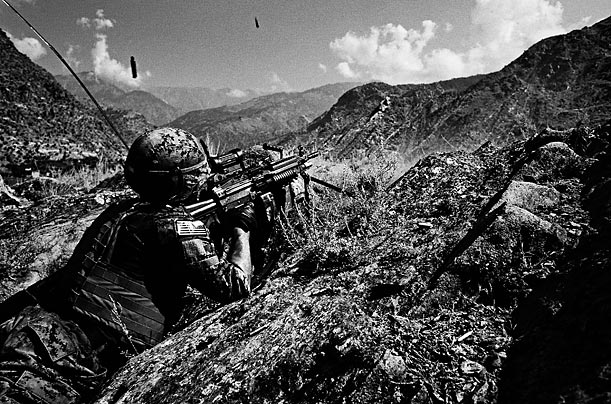IN counterinsurgency, the most important thing is winning over the local population. Gen. Stanley McChrystal, the commander in charge of all NATO forces in Afghanistan, was right to warn that a “crisis of confidence among Afghans” imperils the effort to rebuild the country. For most American troops, however, the only connection they have to the locals — whether soldiers in the Afghan army or villagers they’re trying to secure — is through their interpreters.
United States Army doctrine describes interpreters as “vital,” which is fairly obvious given the bevy of languages spoken in Afghanistan: Dari, Pashto, Tajik, Uzbek and others. Yet the way the military uses translators is too often haphazard and sometimes dangerously negligent. Many units consider interpreters to be necessary evils, and even those who are Americans of Afghan descent are often scorned or mistreated for being too obviously “different.”
Mission Essential Personnel, the primary contractor providing interpreters in Afghanistan, has basic guidelines: interpreters need to be given a place to sleep, for example, and fed. But beyond that, how they are treated is often left up to the individual unit. Many times, they are treated the way they should be: as vital members of a team. Sometimes, however, they are shockingly disrespected.
Earlier this year, I traveled through central Afghanistan as a civilian member of an American Provincial Reconstruction Team. We had a translator — we called her Brooklyn — who had been born and raised in California. During the initial briefing before our convoy set out, however, the team’s commander, an Air Force colonel, demanded that Brooklyn leave the briefing area, referring to her as “that local woman.”
The briefing slides were marked “SECRET,” which caused the colonel understandable alarm. Brooklyn, however, had a security clearance allowing her to be present. Perhaps the real problem was that she wore a headscarf, as one would expect a pious Muslim woman to do.
The next day, as we were driving between two bases, we ran into a traffic snarl at a bridge, with dozens of Afghan soldiers and police officers milling about. Our colonel, who had left his own translator back at his base, got out of his Humvee and asked Brooklyn to begin translating for him. After discussing the issue with the Afghan forces, she explained that they had found several bombs underneath the bridge, and were waiting for an American bomb disposal team to arrive. They had likely saved our lives, but we got that message only because we had an interpreter, the one the colonel had treated like an enemy spy the night before.
“Your interpreter is way more important than your weapon,” Cory Schulz, an Army major who led a tactical team embedded with Afghan troops in Paktika Province, told me. With an interpreter, he explained, you can command hundreds of Afghan soldiers; with a gun, you can only defend yourself.
Interpreters do more than talk and listen. Eight years into the war in Afghanistan, United States troops receive only minimal cultural training before they deploy. Thus interpreters often serve as cultural advisors — helping Americans learn the nuances of typical Afghan behavior.
Major Schulz said of his “terp,” as they’re often called, “he saved my life more than once.” Once the interpreter helped his unit identify a suicide bomber in a large crowd before the man could activate the explosives in his vest. The would-be bomber was acting nervously in a way that Afghans could recognize but that Americans were oblivious to, and the translator picked up on it.
American troops in some isolated parts of Afghanistan have little hope of such guidance. In March I met some officers at Bagram Air Force Base, north of Kabul, who were trying to find an interpreter who spoke Pashai; the Pashai represent only about 1 percent of Afghanistan’s population, but live in some of the most violent and insurgency-ridden areas of the country’s northeast.
Mission Essential Personnel couldn’t supply anyone who spoke the language, the officers told me, yet they felt that being able to speak to the Pashai could prove important for the war effort. So they went to the camp on the outskirts of Bagram where many interpreters live and found one who could speak the rare language. (Later I was told that he had been assigned to a battalion in Khost, 100 miles south of any Pashai-speaking areas, because he also spoke Pashto.)
American officers and enlisted soldiers repeatedly told me how vital interpreters are. Yet there remains no standardized way for units to use them, which can lead to insulting incidents like the one Brooklyn had to endure.
Often, the insults are more subtle, but more personal. In Khost Province, I met an interpreter named Afzal, who worked for a team of Army civilians doing economic and cultural research. Afzal had helped this team for several years, through three rotations of leadership and personnel. He had been trying for a long time to get a visa from the State Department to come to the United States, something many interpreters hope for because of threats to their families. Eventually, extremists began posting threatening letters on his door overnight.
Afzal told me that two years earlier, the team’s leader, a lieutenant colonel, had promised to submit the paperwork for the visa and vouch for his status as an interpreter, but he apparently never did. The next team leader, another officer, made the same promise, but also apparently never followed through. It was not until the arrival of the third team leader, a civilian, early this year that Afzal was able to submit his application. The delay has complicated the procedure — for this year the State Department cut the number of available visas for interpreters from Afghanistan and Iraq to 50 from 500.
As for winning the local population being the most important thing in counterinsurgency (or its center of gravity), I advocate the idea of lines of effort such that killing the insurgents is also similarly important. But Joshua has it exactly right concerning the need for language training and good, reliable interpreters – interpreters who are paid and treated well.






